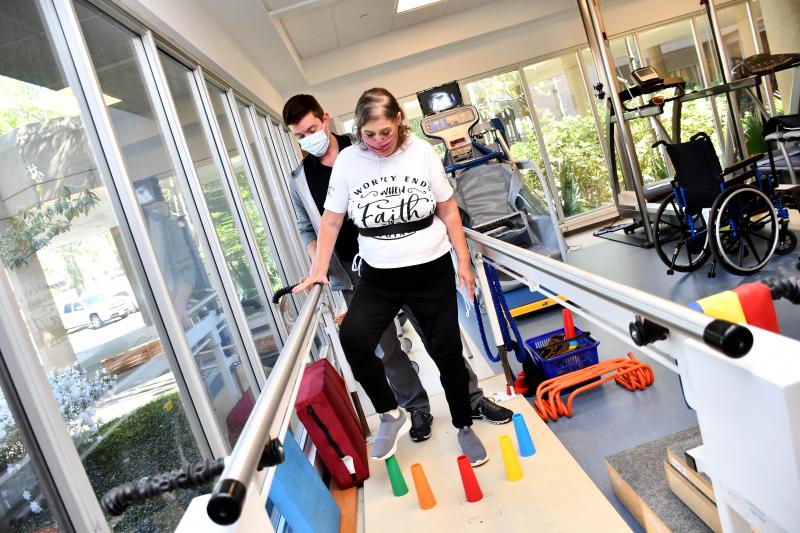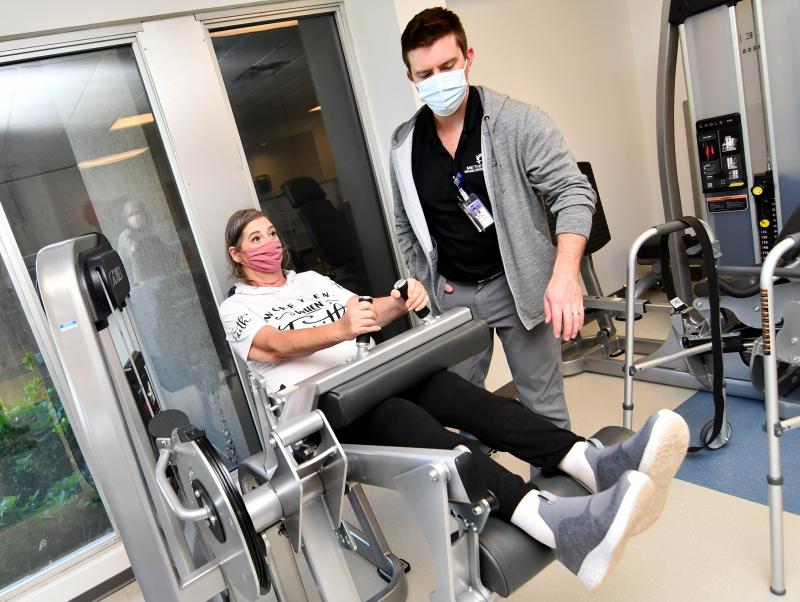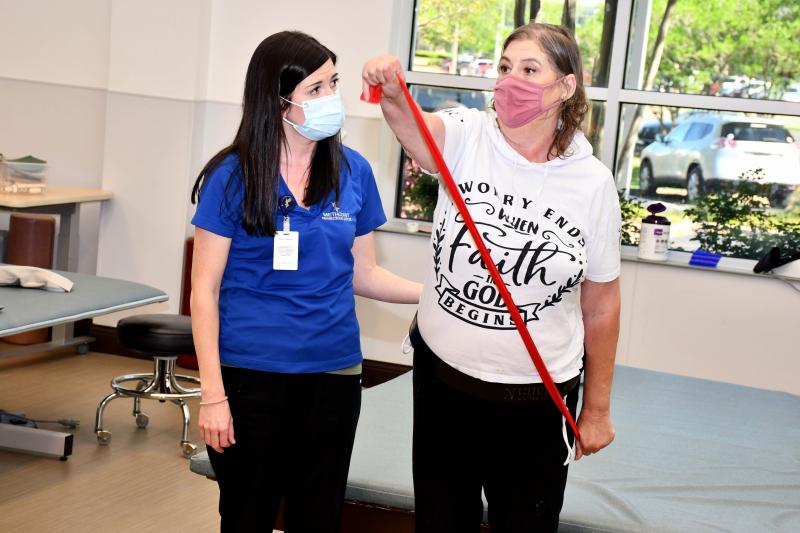Wanda Brandon of Terry first tested positive for COVID-19 on Dec. 1.
Some nine months later, her recovery is still a work in progress.
“People think you have COVID and get over it,” said Brandon, 58, the former assistant director for child nutrition at Hinds County Schools. “But there is so much lingering stuff. It has changed my life.”
Brandon’s list of complications includes pain, insomnia, depression, fatigue, weakness, crippling nerve damage in her right leg---even hair loss.
In February, Brandon turned to Methodist Rehabilitation Center to help her overcome it all. First, she did inpatient therapy at MRC’s Jackson hospital. Now, she’s a twice-a-week regular at Methodist Outpatient Therapy in Flowood.
Helping coordinate her care is the staff at MRC’s Recovery After COVID Clinic. The outpatient clinic encompasses a variety of rehabilitation experts, including a physician, nurse practitioner, wound care specialist, neuropsychologist, pharmacist, nutritionist and respiratory, speech, occupational and physical therapists.
“As a rehab hospital, we already have resources in place to treat the types of conditions associated with post-COVID patients,” said nurse practitioner and clinic coordinator Rhonda Meadows. “That’s why we’re a good referral resource for local physicians who want to streamline their patients’ care. When you need the services of a variety of providers, it’s good to have someone taking a big-picture approach.”
Brandon, for instance, was able to enjoy the convenience of getting a nerve conduction study on her right leg just down the hall from the clinic. Another plus is the clinic puts her in contact with other COVID survivors. “I get to see people who’ve gone through what I’ve been through,” she said.
One of those people is clinic physician, Dr. Michael Montesi. After barely surviving his own bout with COVID in July, 2020, the family medicine practitioner spent months on supplemental oxygen. So he’s well aware that COVID can be as debilitating as it is deadly.
“We’ve seen everything from fluctuating blood pressure to neuropathy and weakness,” he said. “The biggest things are chronic fatigue, shortness of breath and continuing brain fog.”
All are evidence of what is now called “long-haul COVID.” The Centers for Disease Control and Prevention describe the syndrome as “new, returning or ongoing health problems that occur four or more weeks after the initial infection.”
Montesi said other factors—including treatments meant to save lives—also influence how well patients rebound from COVID. Brandon’s nerve damage, for instance, is likely related to being immobile during 10 days on a ventilator.
Extended time in critical care also can lead to post-ICU syndrome, a collection of conditions including severe weakness, problems with thinking and judgment and post-traumatic stress disorders.
It all makes for a complicated recovery that can take time. And for Brandon, the journey has been unsettling.
She had to retire early, leaving a job she’s had for over 33 years. It’s a heartbreaking outcome for someone who worked her way up from cafeteria cook and cherished her career overseeing nutrition services for nine schools.
“It was so much a part of my life for so long,” she said. “I loved the people I worked with and the students. I’ve seen generations … kids whose kids are now there.”
On the plus side, her unplanned retirement leaves plenty of time to devote to her comeback. “I’ve got to do what it takes to get back to where I need to be,” she said. “My motto is: Stronger than yesterday.”
Brandon remembers very little of her days in ICU. All she knows is she was “very lucky to be on this side,” according to staff at St. Dominic Hospital in Jackson. “They told me how blessed I was to be there because they were losing lots of patients,” Brandon said.
When it came time to begin her post-COVID rehabilitation, Brandon said her first choice was inpatient care at MRC.
“I knew if I went to a nursing home, I wouldn’t get the help I needed to get moving again,” she said. “When I first came to rehab they had to use a lift for me to go from the bed to wheelchair. I never thought I’d walk again. God is what got me through it. And the therapists who worked with me were awesome. Even though they’re not family, they treat you like you are.”
MRC occupational therapist Stephanie Mimms said Brandon was so weak she couldn’t even lift her arms over her head at first. “I started telling her to do snow angel exercises in bed,” Mimms said. “And before I knew it, she was lifting her arms up against gravity.
“She was one of my favorite people on the planet. She had a peace about her despite having all these difficulties. She was grateful where she was at and worked hard to improve.”
In physical therapy, Brandon’s main goal was to get back to walking. “But on the front end, she was not very confident that would happen,” said physical therapist Jacob Long. “She was focused on what she had lost.”
“I would look at other people walking and say: ‘Oh Lord, let it be me,’” Brandon said. “I knew I couldn’t go home to my family and not be able to take care of myself.”
Her biggest stumbling block—literally—is she still can’t fully lift the front of her right foot due to nerve damage. So she was outfitted with a lower leg brace to keep her foot in the proper position. “Over time, she quickly got stronger,” Long said. “When she left, she was able to walk around the room without assistance.”
Today, she’s continuing outpatient physical therapy to improve her balance and leg strength. And in occupational therapy, she’s focused on her impaired left hand. “It just feels numb all the time,” she said. “I have to be careful because I will drop stuff.”
Her therapists at Methodist Outpatient Therapy are upbeat about her prospects for recovery. “She comes in and does what she needs to do, and she progresses every time I see her,” said occupational therapist Adrienne Brumfield.
At the time she got infected, Brandon was not yet eligible for a COVID vaccine. Still, she wasn’t overly concerned. “I thought I’d be OK if I got it because I was so active,” she said. “But I wasn’t OK. If it wasn’t for the power of prayer, I wouldn’t be here.”
Now, her message for everyone is “make sure you get vaccinated and take COVID seriously.”
And she reminds them of how much can be lost. “My health is just so different,” she said. “My life is nothing like it was before.”
To learn more about Methodist Rehab’s Recovery After COVID Clinic or to make a referral or appointment, call 601-364-3392.
The Mississippi State Department of Health provides free vaccinations at county health departments and special community locations for anyone 12 years of age or older. (A parent or guardian must accompany minors to their vaccination.). Call the Mississippi COVID-19 Hotline at (877) 978-6453 for appointment assistance. No documentation or identification is required. To schedule an appointment online, go to covidvaccine.umc.edu.



